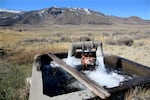
After 26 years with the Oregon Water Resources Department, Ivan Gall became the agency's permanent director July 1, 2024.
Courtesy of the Oregon Water Resources Department
“Oregon needs to recognize that water scarcity is a real thing and it’s here to stay.”
That’s a message from Ivan Gall, who officially took over as director of the Oregon Water Resources Department on Monday.
Gall’s promotion by Oregon Gov. Tina Kotek comes after he spent decades rising through the ranks of the state agency in charge of managing water supplies. During that time, OWRD has repeatedly come under fire in media reports and a state audit for falling short.
A March 2022 OPB investigation showed how state water regulators approved new wells in places where water wasn’t available, without considering the impacts of climate change. The agency’s past approach to regulation has jeopardized some of the state’s most seemingly protected places, like Summer Lake Wildlife Area, and it has allowed water rights in fast-growing regions like Central Oregon to sell to the highest bidders, regardless of aquifer declines or public interest arguments.
Former OWRD Director Tom Byler stepped down in September 2022. The state struggled to recruit a new permanent water department leader for more than a year, before Kotek announced Gall’s appointment in May.
Political opponents of the promotion have questioned how a longtime state agency insider will deliver change. OPB reporters Alejandro Figueroa and Emily Cureton Cook sat down with Gall to ask him what he plans to do differently now that he’s in the state’s top water job.
This interview has been edited for length and clarity.
OPB: Republican [state] senators uniformly opposed your appointment. How do you respond to their accusations that you lack leadership and strategic vision?
Gall: I think the Republican legislators were really speaking to the issue that a lot of their stakeholders and water users around the state recognize, the water scarcity issues here in the state.
I recognize that water users are frustrated with some of the department processes. One of my main focuses is going to be modernizing our application review process both for new applications and water right transfers.
With respect to lacking leadership experience, I’ve been a manager at the department since 2007. I’ve participated in any number of significant policy issues here at the department and really don’t understand where they came up with that.
Oregon needs to recognize that water scarcity is a real thing and it’s here to stay. Climate change is going to continue to have increased impacts on our water supply. As our supply goes down, our likely demand is going to go up with warming temperatures. We have to deal with these issues and it’s on the policymakers and agency leaders to help Oregon and Oregonians improve the way that we manage our natural resources here in the state, including water.

Water gushes from an artesian well at a former homestead inside Summer Lake State Wildlife Area. Feb. 18, 2022.
Emily Cureton Cook / OPB
OPB: You’ve been with the department in various capacities for over 25 years. What would you do differently if you were starting your career over again?
Gall: I don’t know that I would do anything differently with my career. I have been very fortunate to have worked with some very smart people … And one of the reasons that I got into management is that I wasn’t content with the way things were being done, and so I wanted to help be an agent of change. Really, the only way to do that is to get into management and work your way up the ladder there.
I had a lot of support. People trusted me. I think I delivered on what I promised, and so I don’t think I would choose a different path, or do anything differently than what I did. I wish I could have clarified more for the citizens of Oregon and the legislators earlier in the process, the coming issues of scarcity, many of which some of us saw some years ago.
OPB: Can we drill down a little bit more on how you will address OWRD’s past that created a system with more water rights than there is actual water across much of Oregon?
Gall: It’s certainly my intention not to issue additional water rights in areas where water is not available. I think it’s important for us to manage this resource in a sustainable fashion. We have numerous examples around the state where we’ve over-allocated both surface water and groundwater.
Traditionally, [with] the over-allocation of surface water, the system was almost built to over-allocate in the early years, and they would just rely upon [OWRD] staff to come out and conduct regulation and distribution during times of shortage. Junior users would be shut off or shut back, in order to convey water down to a senior user.
That principle doesn’t work very well in aquifer systems. And of course we’ve taken stream systems and allocated so much water that there are many junior users in some stream basins that rarely get to exercise their water right at all anymore.
OPB: Can you give us some concrete examples of what is going to be different and what are your first priorities for change?
Gall: I can hold up a good example that we’ve been working on here close to the last two years, an update to our groundwater allocation rules. The state’s allocation policies both for surface water and groundwater are many decades old. Those [new groundwater rules] are going to be going toward adoption by the Oregon Water Resources Commission later this year.
[Oregon’s] 1955 groundwater statute actually called for determining and maintaining reasonably stable groundwater levels. They were quite insightful back then. The rules that were adopted in 1988, though, really only focused on short-term impacts and individual impacts from individual [water rights] applications coming in the door.
Moving forward, we’re taking a more proactive approach to look at long-term impacts and cumulative impacts about groundwater development on a basin.
OPB: How will you be accountable for shifting the culture of the water resources department and having that translate to sustainable water supplies?
Gall: I heard pretty loud and clear through the confirmation process that the legislative body’s going to do everything they can to hold me accountable and hold the department accountable.
In conversations with the governor and the governor’s office, they have very high expectations for the water resources department and for me in particular, to bring this modernization around and get things working in a fashion that’s much better for all Oregonians.